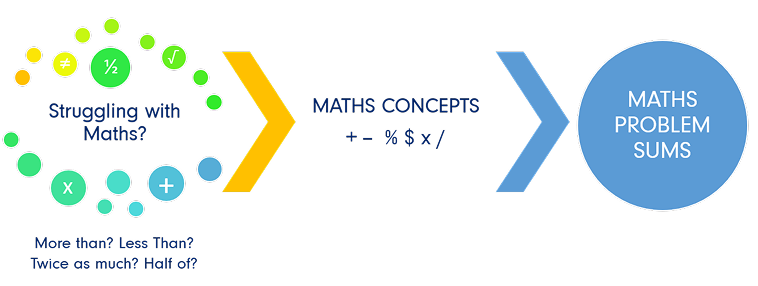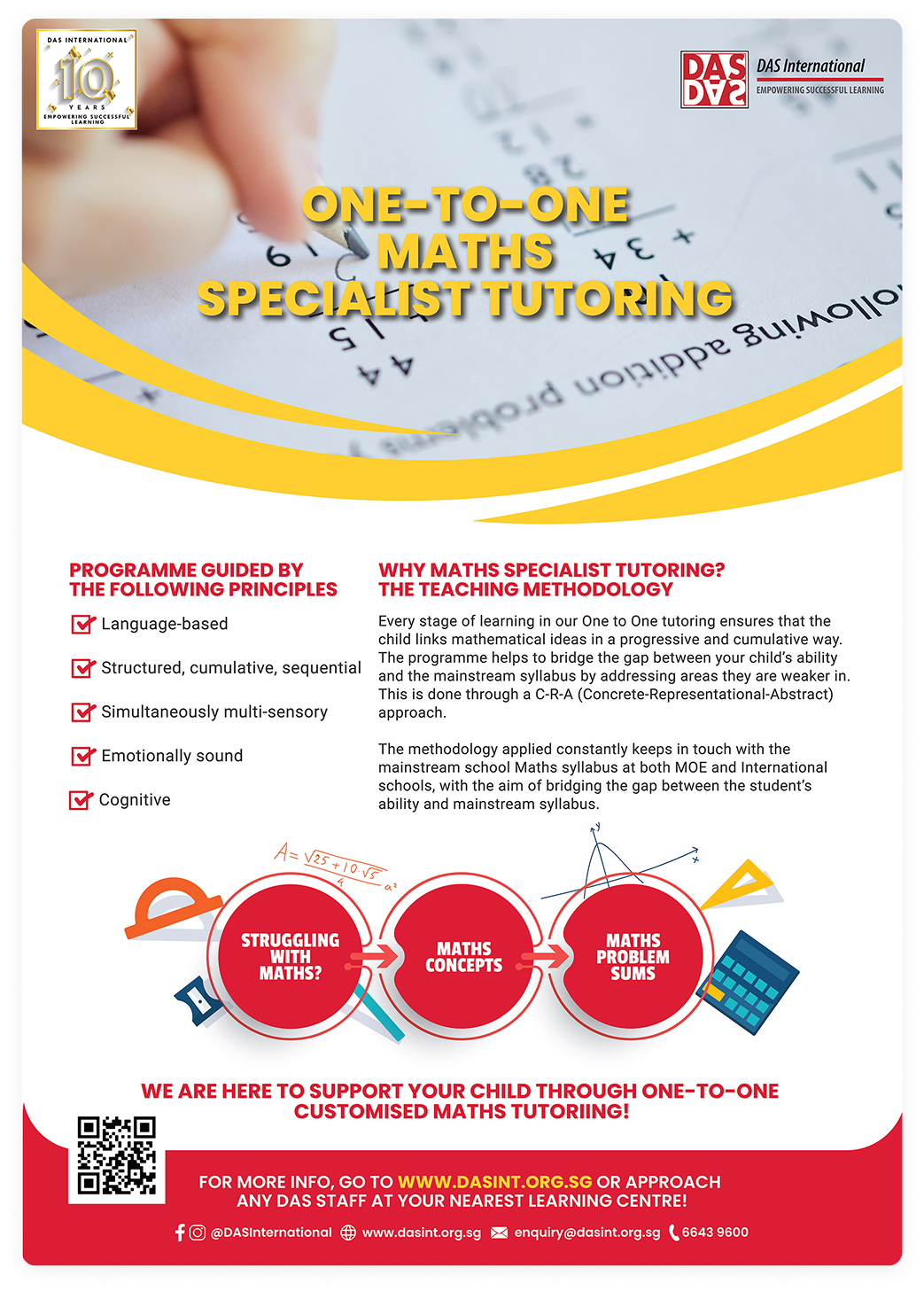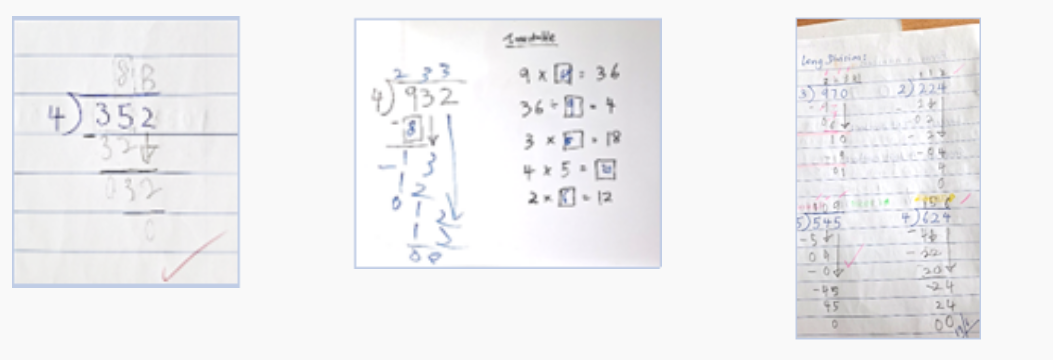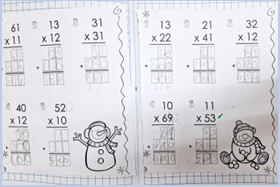Why Maths Specialist Teaching?
Maths Teaching Methodology
Riding on the teaching methodology of the successful evidence-based DAS Maths programme, every stage of learning of our One-to-One support ensures that the child links mathematical ideas progressively and cumulatively. The programme helps to bridge the gap between your child’s ability and the mainstream syllabus by addressing areas where they are weaker. This is done through a C-R-A (Concrete-Representational-Abstract) approach. The methodology applied constantly keeps in touch with the mainstream school Maths syllabus at both MOE and International schools, intending to bridge the gap between the student’s ability and the mainstream syllabus.
Our Philosophy
The Specialist Maths Support is guided by the following principles:
- Language-based
- Structured, cumulative and sequential
- Simultaneously multi-sensory
- Emotionally sound
- Cognitive
Students facing challenges in Maths may be experiencing the following difficulties
- Weakness in short-term memory
- Understanding the vocabulary of mathematics
- Problems with sequencing
- Challenges following multi-step calculations

Resources Used
We use concrete materials and teaching manipulatives to explain basic maths concepts to students where necessary. Students are provided with hands-on experience to handle these materials to aid their understanding of the relevant maths concepts.
DAS International has a team of specialist teachers who have extensive experience in supporting students with specific learning differences and other learning needs. Our specialist teachers are experienced in the International as well as the Ministry of Education (MOE) systems, they have an understanding of the curriculum and the demands that today’s education systems place on your child.

To see our Specialist Teachers, please click here
Check out what our Specialist Teachers would like to say about the experience!
Supporting My Struggling Learner in Maths
By Meetal Madia
Profile of my Student
Meet Ryan (name changed), a Singaporean Primary 3 student who is 9 years old. Ryan shows signs of learning difficulties and working memory challenges, especially when it comes to sequencing steps for math operations such as regrouping, multiplication, division, and word problems. He was only recently diagnosed with dyslexia, he also experiences bullying at school—often due to his physical appearance and perceived academic weaknesses. Despite these hurdles, Ryan enjoys sharing stories about his favourite fast cars, Goo Jitzu toys, and overseas travels, and he has built a trusting bond with me, his Specialist Teacher.
Strategies to Support Ryan’s Learning
Open Communication and Rapport
One of the first and most crucial steps is building an open channel of communication. Encouraging Ryan to express his difficulties helps create a safe space for him to ask questions. By acknowledging his interests—cars, toys, food, and travel—I can integrate these topics into our lessons as a positive incentive.
Starting with Success
To prevent math avoidance, I begin each session with problems Ryan can solve independently or with minimal help. This early success boosts his confidence and sets a positive tone for tackling more challenging questions later.
Reviewing and Re-teaching Concepts
Often, Ryan needs a refresher on previously learned material. I keep a jotter book filled with keynotes and examples from past lessons, using colour coding to highlight steps—especially for multi-step operations like long division. This visual approach reinforces what he’s already learned and makes it easier to fill in any gaps.

Mastering Times Tables
A strong command of multiplication facts is essential for many mathematical operations. We spend time chanting times tables aloud, creating brief quizzes, and systematically introducing any that Ryan hasn’t fully mastered. Presenting them in different sequences keeps him engaged and encourages better recall.

Accessible Worksheets
Worksheets with larger font, clear spacing, and fewer questions per page help Ryan stay focused. Allowing him to choose how many problems to attempt also gives him a sense of control and prevents overwhelm. After he gains confidence with simpler tasks, we gradually move on to more complex problems.

Structured Lesson Plan
At the start of each lesson, I outline exactly what we’ll be working on. Knowing the lesson plan in advance helps Ryan mentally prepare and reduces anxiety, making it easier for him to participate fully.
Celebrating Effort and Progress
Ryan’s internal drive to keep trying, even when faced with setbacks, is a crucial strength. I make sure to celebrate milestones—especially when he solves a problem that previously stumped him. This positive reinforcement fuels his resilience and reminds him how far he’s come.
Final Thoughts
Supporting a struggling learner in math goes beyond simply reteaching concepts.
It involves building a trusting relationship, acknowledging small victories, and adapting resources to meet the student’s unique needs. For Ryan, these strategies have not only improved his math skills but also boosted his confidence. With patience, encouragement, and consistent support, every child can learn to approach math with a sense of possibility rather than fear.
Learn more about Specialist Teaching for Maths
updating….



